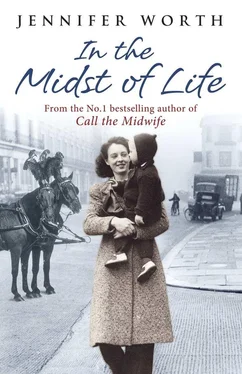Jennifer Worth - In the Midst of Life
Здесь есть возможность читать онлайн «Jennifer Worth - In the Midst of Life» весь текст электронной книги совершенно бесплатно (целиком полную версию без сокращений). В некоторых случаях можно слушать аудио, скачать через торрент в формате fb2 и присутствует краткое содержание. Жанр: Биографии и Мемуары, на английском языке. Описание произведения, (предисловие) а так же отзывы посетителей доступны на портале библиотеки ЛибКат.
- Название:In the Midst of Life
- Автор:
- Жанр:
- Год:неизвестен
- ISBN:нет данных
- Рейтинг книги:3 / 5. Голосов: 1
-
Избранное:Добавить в избранное
- Отзывы:
-
Ваша оценка:
- 60
- 1
- 2
- 3
- 4
- 5
In the Midst of Life: краткое содержание, описание и аннотация
Предлагаем к чтению аннотацию, описание, краткое содержание или предисловие (зависит от того, что написал сам автор книги «In the Midst of Life»). Если вы не нашли необходимую информацию о книге — напишите в комментариях, мы постараемся отыскать её.
In the Midst of Life — читать онлайн бесплатно полную книгу (весь текст) целиком
Ниже представлен текст книги, разбитый по страницам. Система сохранения места последней прочитанной страницы, позволяет с удобством читать онлайн бесплатно книгу «In the Midst of Life», без необходимости каждый раз заново искать на чём Вы остановились. Поставьте закладку, и сможете в любой момент перейти на страницу, на которой закончили чтение.
Интервал:
Закладка:
Mrs Cox was typical of her generation: patient, uncomplaining, enduring passively all that was heaped upon her. She was in a side ward, with the windows kept open at all times, and a fan continually blowing the air in the room away from the corridor, and hopefully out of the window. But still we could not prevent the dreadful smell from penetrating the corridor. Mrs Cox barely spoke; her dull eyes flickered from the massive erupting growth, as large as a dinner plate, to the other breast, where a few smaller sores had started to discharge and bleed. Like many women of her age, she had withdrawn from her friends and family to await death, but a daughter had insisted on calling a doctor, an older GP who had seen this sort of thing before, and was unsurprised. An oncologist was consulted, who said that surgery was impossible, and advised radium treatment, which might dry up some of the exudate, and hopefully reduce some of the growth.
If we, at the Marie Curie, could make the last weeks of her life more comfortable, the treatment would be worthwhile. We were also able to administer drugs to relieve the pain. The Brompton Cocktail was frequently given, which contained morphine, cocaine, belladonna and gin. Every four hours Mrs Cox drank it gratefully. She was grateful for everything – a glass of water, a clean sheet, a face wash, or a hair brush drawn through her stringy grey hair. She did not express her thanks in words, but her eyes showed it. I often performed these small tasks myself, because I could see how close to death she was, and I knew that the young nurses, who were of another generation, and had seen nothing like Mrs Cox’s ulcerating cancer before, were afraid to go near her. We could not cover the excoriated breast with any surgical dressing, because dressings have to be changed when they become soaked in body fluids. This occurred frequently and quickly, and when we pulled the dressing off, lumps of decomposing flesh and cancerous material came away with it, causing pain. It is not surprising the nurses are afraid of her, I thought, and I wondered how the radiographers, two healthy young men, viewed this tragic woman.
‘Your treatment is helping, isn’t it, Mrs Cox?’ I said as I handed her the Brompton Cocktail. I did not say ‘making you better’, as we were taught to say, perpetuating the lie that modern medicine makes everything better.
She nodded. ‘And you will have another on Friday.’ I continued, ‘that makes four. When you have had six treatments I’m sure you will feel a lot easier.’
Again she nodded wearily.
‘Your daughter said she would come and see you tomorrow.’
Her lips moved, but any words were unrecognisable. I did not want to say any more about the daughter, who might or might not come, and I suspected that her sons never would. Mrs Cox would probably be left to die alone.
But in this I, as ward sister, had control. I had no control over the inexorable course of the disease, nor over the treatment, nor had I any influence over the sons and daughters whom she had borne and brought up, and who were now rejecting her, but I was absolutely determined that she would not die alone. In those days it was regarded as an essential nursing duty to be with a person throughout the time of dying, especially at the actual moment of death. It was regarded as a disgrace to the ward sister, or staff nurse in charge, if a patient died alone.
We prepared Mrs Cox for her third treatment with radium. Two porters came and lifted her on to the trolley and I went with her to the radiotherapy unit, holding the sheet above her breast so that the men would not have to look at it.
Half an hour later I accompanied her back to the ward. The radiographer told me that her blood pressure had dropped during treatment. Her skin was even more sallow than it had been before and her pulse was very weak, her blood pressure barely perceptible. Although her eyes flickered when I spoke to her, and she gave a little moan, she did not appear to be conscious. The porters wheeled her back to the ward and lifted her on to the bed.
We never knew whether the radium treatment had made her more comfortable, because that afternoon, peacefully, quietly, Mrs Cox accepted death with the same uncomplaining resignation that she had accepted life.
‘Dinners is hup, Sister.’
Gladys, the indispensable ward maid, stood in the doorway, arms folded, legs apart, her face expressionless. She knew more about the hospital and how it functioned than anyone, but she never intruded, never grumbled, and above all, never gossiped. One could rely on her discretion, something that, in a cancer hospital, where most of our patients would die, was essential. Thoughtless remarks, a hint or a nudge here or there, could spark off an atmosphere of uncertainty that could escalate, causing patients and their families distress.
The morning had been hectic with, as usual, a shortage of staff, too many duties, and too little time in which to get them done: dressings to change; a drip to install; blood to take; patients to prepare, take to, and return from therapy; the drugs to take round and DDAs to check; a couple of admissions; a patient discharged, with her drugs and treatments to organise and explain to the daughter who was collecting her; the linen arriving from the laundry; someone needing catheterisation; another a bath which he could not manage himself. Morning coffee had been disrupted by three or four radium patients vomiting; the telephone ringing, with a message from dispensary – a drug was available, could a nurse come and collect it? But why could the dispenser not send it up to the ward? They were too busy, the woman said. Does no one ever imagine that the ward is too busy? As we had needed the drug badly for two days, I sent a nurse to get it. And in the rush of work the oncologist – the Chief, we called him – arrived to see a new patient.
He found me in a side ward, washing the mattress of a patient who had died during the night.
‘This is a surprise, Sister. Haven’t you got a nurse or an orderly to do that sort of thing?’
All the nurses are busy, and one orderly is off sick. Anyway, a sister should never be too grand to do the menial tasks. I want this room for Mr Waters because I don’t want him to die in the main ward if it can possibly be avoided – it’s unsettling for the other patients. None of them see themselves getting to that state.’ I cleaned the sides of the mattress. ‘There, it’s done now, and I’m with you.’
Together we went to the bedside of the new patient. Hospital protocol required that I should stay with the consultant whilst he remained in the ward, but Hannah appeared in the doorway with her ‘dinners is hup, Sister’, and a look of command on her heavy features.
‘Then I had better not delay you, Sister,’ the Chief said. ‘We will be doing the full ward round tomorrow morning.’
I walked swiftly to the kitchen, to the ward orderly in pink, the half circle of nurses in blue, each holding a tray, the electric food trolley plugged into the wall, waiting my attention. It had always seemed extraordinary to me that the serving of patients’ dinners occupied such a large part of a sister’s duties (the whole process took the best part of an hour), and that all nursing staff looked to her for the lead. It was a relic of the old days, when drugs and surgery were in their infancy, and when so many people who came into hospital were chronically malnourished, so that the dietary needs of each patient were important.
I tucked the tea towel into my belt to protect my uniform from gravy splashes, and removed the aluminium lids from each container. I served a full dinner for several patients, which the nurses took, returning a few minutes later with empty trays.
‘Take this to Mrs J. and see that she can manage. Stay with her, if necessary.’
Читать дальшеИнтервал:
Закладка:
Похожие книги на «In the Midst of Life»
Представляем Вашему вниманию похожие книги на «In the Midst of Life» списком для выбора. Мы отобрали схожую по названию и смыслу литературу в надежде предоставить читателям больше вариантов отыскать новые, интересные, ещё непрочитанные произведения.
Обсуждение, отзывы о книге «In the Midst of Life» и просто собственные мнения читателей. Оставьте ваши комментарии, напишите, что Вы думаете о произведении, его смысле или главных героях. Укажите что конкретно понравилось, а что нет, и почему Вы так считаете.












